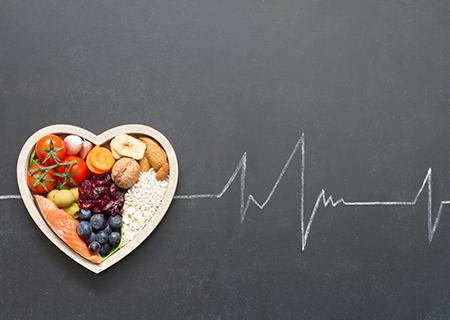
Lifestyle and cardiovascular diseases
In recent decades in Western countries there have also been changes in the lifestyle of the population that have caused an increase in cardiovascular and cerebrovascular diseases.
I WHO data (World Health Organization) in fact indicate that these diseases are the leading cause of death in the world.
Their incidence, however, could significantly decrease through the reduction of risk factors, early diagnosis and prompt treatment. Do you want a healthy heart? Start paying more attention to what you bring to the table!
Among the main risk factors for heart disease arein fact, the overweight and obesity, too high cholesterol and hypertension: all dangers you can protect yourself from with a balanced diet.
Le cardiovascular and cerebrovascular diseases affect the blood vessels and the main organs supplied by them. The most frequent are of atherosclerotic origin: the thickening and loss of elasticity of the arterial walls, due to the deposit of fats, cause the narrowing of blood vessels and the reduction of blood flow not allowing blood to reach the organs and tissues in adequate quantity.
Among these diseases, which they particularly affect the adult population, the most frequent are: Angina pectoris, Cardiac infarction, Ischemic and haemorrhagic cerebral stroke.
The appearance of atherosclerosis, that is, the progressive narrowing of the arteries, is facilitated by the so-called risk factors which, known, can be corrected and controlled.
Among the factors, presumed "not modifiable" we find again:
> age (the risk of contracting these diseases increases with age);
> familiarity (the presence of cardiovascular and cerebrovascular diseases in first degree relatives (parents, brothers / sisters, children) in particular with less than 55 years in men and 65 in women, determines a higher probability of suffering from these diseases)
> sex (men more at risk than women before the menopausal age).
Among the "modifiable" factors we have instead:
> smoke;
> power supply;
> hypertension;
> hyperlipidemia;
> diabesity;
> high abdominal adiposity;
> sedentary lifestyle.
The diet for the heart: prevention work
There is no ad hoc diet in case of convalescence from heart disease, but there are instead good dietary rules, to be put into practice regularly and consistently, which help to protect or control the risk of disease.
Especially for those who have recovered from heart disease, experts recommend setting a diet that ensures a correct intake of fats, proteins, carbohydrates and that you eliminate alcoholic beverages in particular.
The prevention of heart disease, of the brain e of the vases goes by the simplest way: the quality and quantity of the food we eat every day.
It has been discovered and written everywhere that the Mediterranean diet helps to keep healthy heart, il brain, arteries and veins, because it is balanced, low in harmful fats and rich in fruits and vegetables.
Red wine, raw olive oil, tea, raw and fresh vegetables, fruit and fish are suitable for those who want to reduce or maintain low cholesterol and homocysteine, two important risk factors.
An important recommendation is not to demonize fats: exist good fats, essential to absorb fat-soluble vitamins (A, D, E, K), to build cell walls and hormones.
And less good fats, the TRANS SATURED ones are very stable chemically, they are eliminated in many days in the normal metabolism and are found in sweets, bread, crackers, margarine, fried potatoes, baked goods, foods of animal origin and in their own sauces for their "indestructibility" which increases the conservation of the product.
Cardiovascular diseases, as a whole they are caused by an imbalance in the intake of the type of fat and the quantity taken that is not disposed of correctly.
According to experts, in fact, it is good to follow these rules:
> Reduce sausages and processed meats (mortadella, salami, sausages, wurstel, hams, bresaola ...) no more than once a week.
> If you eat meat, favor white meats (chicken, turkey, rabbit) and limit the red ones to 1-2 portions of 100g per week.
> Increase the consumption of fish 3-4 times a week, with a preference for oily fish with a high content of Omega3 fatty acids which inhibit platelet aggregation.
> Reduce the consumption of salt.
> Pay attention to the consumption of eggs, which in general for a healthy person should not exceed 4 eggs per week (including those present in prepared foods).
> Try to prefer i fats of vegetable origin, such as extra virgin olive oil, avoiding animal ones as much as possible (butter, lard, lard, cream).
> Choose skimmed milk and yogurt or partially skimmed.
Foods and substances that are good for the heart
But if, in fact, it matters minimize the salt, avoiding sausages and particularly aged cheeses, on the other hand there are some foods that should be privileged, because they help protect heart health.
In particular there are six nutrients that are particularly good for you in those at risk of contracting heart disease.
> Beer: contains numerous nutrients, such as vitamins, minerals and salts. It is rich in phenols which have a strong antioxidant power. Moderate consumption of beer can have beneficial effects on the cardiovascular system.
> Chocolate: in addition to containing polyphenols, excellent allies with antioxidant action, it also contains magnesium which protects the muscles in general, and therefore also the heart. Obviously, the darker the better.
> Coenzyme Q10: with high antioxidant potential, it fights inflammation, also protecting against tumors. It is found in fish, eggs and meat.
> Brazilian nuts: very rich in selenium, which has properties similar to Vit. E going to lower cholesterol.
> Vitamin C: stimulates the immune system, lowers cholesterol and protects the heart system. Citrus fruits, kiwis, parsley and red onions are rich in it.
> Garlic and onion: they contain allicin, a substance a molecule that is able to reduce the production of cholesterol in the liver and which has antiviral, antibacterial, antidiabetic, antitumor and antifungal properties. Allicin itself appears to have the ability to reduce pressure and counteract platelet aggregation.


























